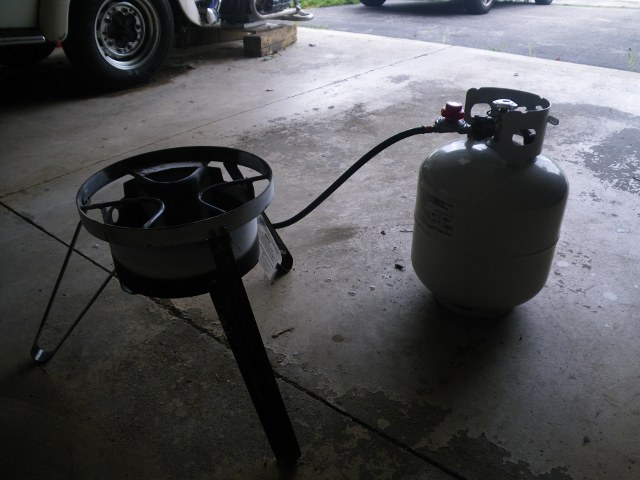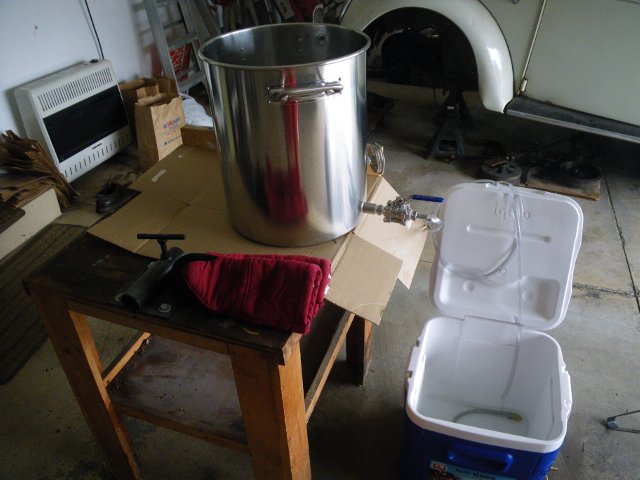moldmaker
Well-Known Member
After 11 years of extract/specialty grain kits, I completed my first all-grain brew day. The recipe is an American Red that I found in the recipe section:
9lbs 2-row
2lbs crystal 40L
2oz roasted barley
2oz Willamette for 60 min
Wyeast #1056
Mash at 154F for 60 min
I have an Igloo IceCube with a stainless braid as my MLT. I have a 10-gallon kettle from Spike Brewing with stainless 3-piece ball valve, thermometer and sightglass. It's a really nice piece! It is both the HLT and BK right now, and I can see that a second one would be REALLY helpful to have. I put all the ingredients into BeerSmith and tried to follow as closely as I could.
Can I run down my brew day? I'd like to get some thoughts.
Mash:
Heat 8 gal water to 176F. I transferred 13.9 qt to the tun according to BeerSmith. It dropped to 165F, so I doughed-in. I was shooting for 154F to mash, but only hit 150F. I accidentally mashed for 100 minutes instead of 60 due to losing track of time and reading this site. I lost 3 degrees over that time, so I will be investigating the insulation in the cooler's lid.
Sparge:
BeerSmith had me doing batch sparge, two steps, with 1.01 and 3.15 gallons at 168F. I heated 1.01 gallon to boiling and dumped it in with barely a budge in temperature. Stir and then vorlauf 2qts, dump it back in, vorlauf again, dump it into the kettle. I drained and additional 2.75 gallons of wort in about 10 minutes. The second step of the sparge, I heated 3.5 gallons to boiling, dumped it in and stirred. Nailed it on 168F. Vorlauf and drain. I collected 3.25 gallons the second time in about 30 minutes. In total, I had just under 6.5 gal of wort. BeerSmith was calling for 6.30, which I felt was pretty close. Target pre-boil gravity was 1.045, which I sorely missed at 1.020.
Boil:
Once I hit boiling, I added hops and promptly forgot to close the bag, so hops all over the kettle. I boiled for 60 minutes, and attempted to drain into the fermentor, but had hops plugging everything up. I just dumped the entire kettle in, hops, sediment and all. I ended up with 5 gallons at 1.050. BS wanted 5.72 gallons at 1.054. Ran the wort chiller and filled up the washing machine at the same time. Pitched the yeast at about 78F and called it a day, after 7 hours.
I boiled for 60 minutes, and attempted to drain into the fermentor, but had hops plugging everything up. I just dumped the entire kettle in, hops, sediment and all. I ended up with 5 gallons at 1.050. BS wanted 5.72 gallons at 1.054. Ran the wort chiller and filled up the washing machine at the same time. Pitched the yeast at about 78F and called it a day, after 7 hours.
Issues:
1) I think there will be contamination, as I did not sanitize the spoon or the thermometer when chilling and adding yeast.
2) Did I sparge too fast?
3) Probably need to heat the strike water a little hotter, now that I know how much heat I lose during transfer and dough-in.
Hit me, folks. I could use the comments and criticism.





9lbs 2-row
2lbs crystal 40L
2oz roasted barley
2oz Willamette for 60 min
Wyeast #1056
Mash at 154F for 60 min
I have an Igloo IceCube with a stainless braid as my MLT. I have a 10-gallon kettle from Spike Brewing with stainless 3-piece ball valve, thermometer and sightglass. It's a really nice piece! It is both the HLT and BK right now, and I can see that a second one would be REALLY helpful to have. I put all the ingredients into BeerSmith and tried to follow as closely as I could.
Can I run down my brew day? I'd like to get some thoughts.
Mash:
Heat 8 gal water to 176F. I transferred 13.9 qt to the tun according to BeerSmith. It dropped to 165F, so I doughed-in. I was shooting for 154F to mash, but only hit 150F. I accidentally mashed for 100 minutes instead of 60 due to losing track of time and reading this site. I lost 3 degrees over that time, so I will be investigating the insulation in the cooler's lid.
Sparge:
BeerSmith had me doing batch sparge, two steps, with 1.01 and 3.15 gallons at 168F. I heated 1.01 gallon to boiling and dumped it in with barely a budge in temperature. Stir and then vorlauf 2qts, dump it back in, vorlauf again, dump it into the kettle. I drained and additional 2.75 gallons of wort in about 10 minutes. The second step of the sparge, I heated 3.5 gallons to boiling, dumped it in and stirred. Nailed it on 168F. Vorlauf and drain. I collected 3.25 gallons the second time in about 30 minutes. In total, I had just under 6.5 gal of wort. BeerSmith was calling for 6.30, which I felt was pretty close. Target pre-boil gravity was 1.045, which I sorely missed at 1.020.
Boil:
Once I hit boiling, I added hops and promptly forgot to close the bag, so hops all over the kettle.
Issues:
1) I think there will be contamination, as I did not sanitize the spoon or the thermometer when chilling and adding yeast.
2) Did I sparge too fast?
3) Probably need to heat the strike water a little hotter, now that I know how much heat I lose during transfer and dough-in.
Hit me, folks. I could use the comments and criticism.







